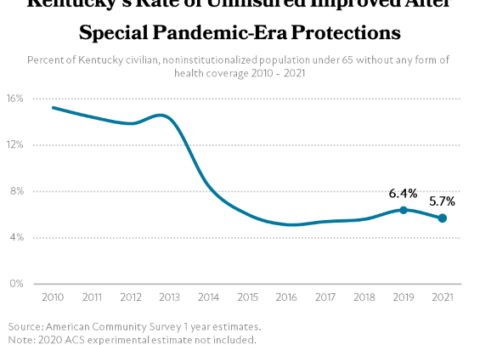The President’s announcement of the American Families Plan yesterday puts us one step closer to seizing the historic opportunity to build a stronger recovery and an equitable economy that works for all Kentuckians.
COVID-19 and its economic fallout have further exposed long-standing problems that have held back Kentuckians for decades: Many families with low incomes or living in distressed rural and urban communities can’t afford housing, child care, health care, food or other basic needs, and face serious economic instability if they lose their jobs, get sick or there’s a recession. Because of systemic racism, Black, brown and immigrant Kentuckians face unequal opportunities and outcomes in education, employment, health and housing — disparities that have glared in the pandemic. And our economy lags because we haven’t made the public investments that we know pay off, such as in high-quality early childhood education, in modernizing our physical and digital infrastructure, and in fighting the threat of climate change.
The recovery proposals in the American Jobs & Families Plans begin to address these challenges and build an economy where all our children and families can make ends meet and our economy can truly thrive. Together, these two historic proposals would do the following and more:
- Invest in quality, affordable child care by expanding child care subsidies, building child care facilities and permanently increasing the Child and Dependent Tax Credit.
- Strengthen public education by providing preschool to all 3- and 4-year-olds and two years of free community college through funding to states, and make higher education more affordable by increasing Pell Grants and reducing tuition at higher education institutions serving people of color.
- Reduce child poverty by extending the American Rescue Plan (ARP) Child Tax Credit expansion through 2025 and making it permanently fully refundable, and reduce childhood hunger by making the ARP’s summer nutrition programs permanent.
- Make health care more affordable by extending the ARP’s increase in premium tax credits.
- Support families’ caregiving responsibilities by creating paid family and medical leave, and allowing more people with disabilities and older people to live well at home through investments in home- and community-based care that also create jobs and improve job quality for home care workers.
- Improve the nation’s roads, bridges, public transit, drinking water, broadband and low-income housing stock, creating jobs and laying the foundation for greater prosperity.
- Address climate change by creating good-paying union jobs in modernizing the energy grid, improving energy efficiency of buildings, conducting environmental restoration, generating renewable power and bringing clean manufacturing jobs back home.
Congress should quickly act on these proposals and build on them further, such as by making the temporary Child Tax Credit expansion permanent, increasing low-income housing assistance, taking additional steps to make healthcare affordable and strengthening the nation’s unemployment insurance system. Our wealthy nation can afford to make all of these critical investments and more — and we can’t afford not to.
For decades, people at the very top and corporations have reaped outsized gains and used special tax breaks and loopholes to avoid chipping in towards investments in infrastructure, healthy families and thriving communities. It makes sense, as these plans propose, to ask the wealthiest among us and corporations to pay a fairer share of federal taxes to help build an economy that works for all of us.
There is light at the end of the tunnel with the pandemic. The ARP and other relief proposals have helped Kentuckians endure a very difficult period. But we cannot simply return to the pre-pandemic economy with its growing inequality and widespread insecurity. Kentuckians need Congress to act with the kind of investments laid out in these recovery proposals and begin creating an economy that truly works for everyone.
Statement from Kentucky Center for Economic Policy Executive Director Jason Bailey.


